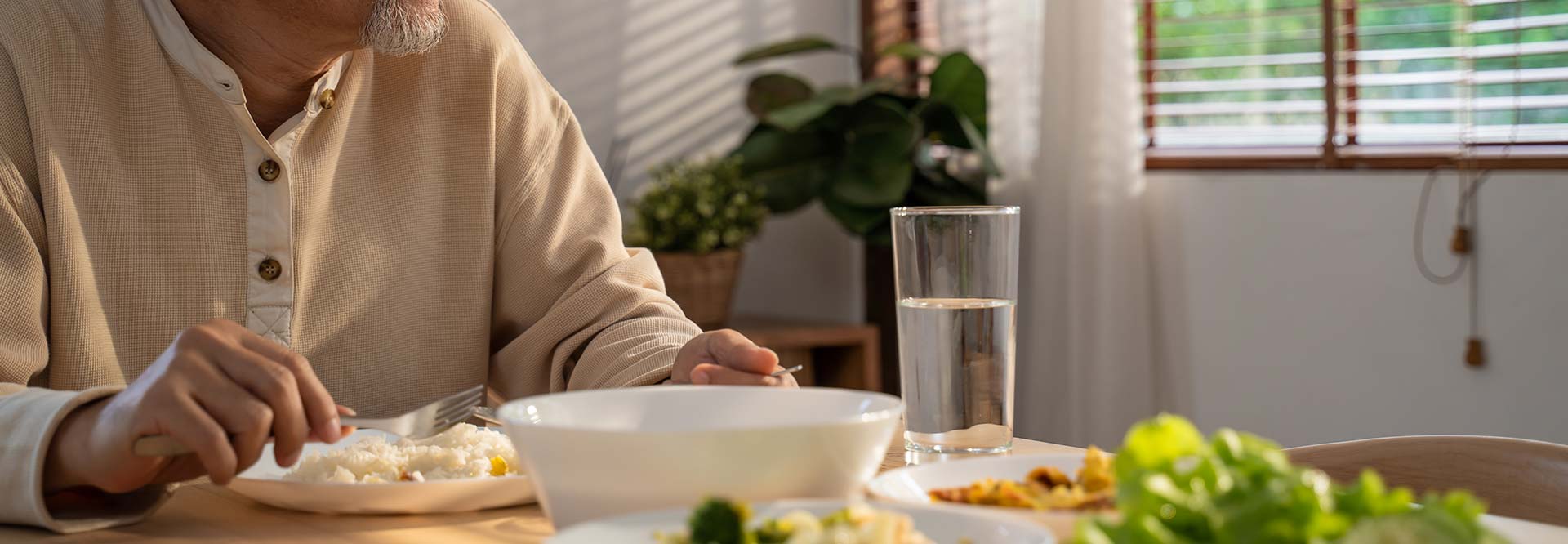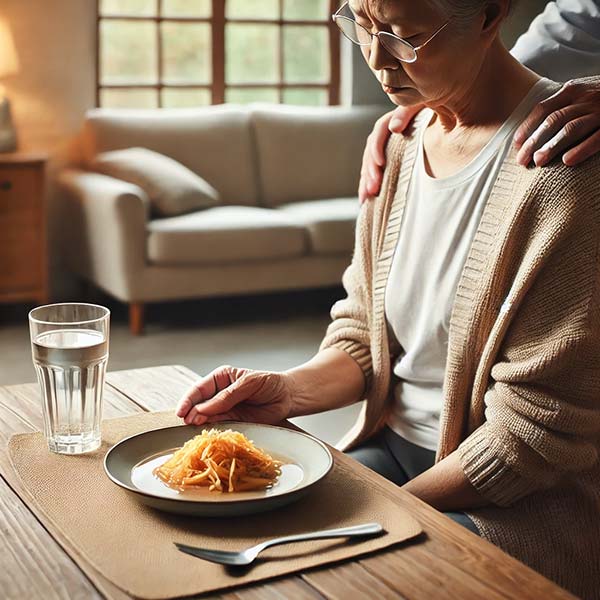
To make mealtimes easier for your parents, prepare healthy, easy-to-reheat meals that simplify eating. Clearing out their refrigerator and cabinets can also help reduce the stress of cooking and meal preparation. Additionally, consider making food more manageable by cutting it into smaller pieces or preparing softer meals.
If possible, arrange for someone to share meals with them, as eating alone can be discouraging. However, their reluctance to eat may stem from underlying issues such as dental problems, vision impairment, medication side effects, health concerns, or mobility limitations. Consulting their doctor can help identify the cause and find an appropriate solution.
Increasing the amount of food consumed by a loved one can be made easier with your assistance. As a first step, serve regular meals and snacks. Their body will learn to eat at certain times even if they are not particularly hungry. You can also reduce their meal size to a less daunting amount. Alternatively, switch to foods that are easier to eat without utensils, such as chicken nuggets, cheese, veggies, etc. Soups, smoothies, and even healthy milkshakes can help the elderly eat when they cannot eat their regular meals, so keep these on hand.
If you’re caring for an elderly loved one, you may notice they eat less or become selective about their meals. Natural changes in energy levels, metabolism, and physical activity can lead to a reduced appetite. However, sudden weight loss or restrictive eating can be concerning. Significant weight loss, particularly a 10% or greater reduction, can weaken the body’s ability to recover and is linked to higher mortality rates in older adults.

A decreased appetite can signal depression, declining health, or a sedentary lifestyle. Some elderly individuals may lose interest in eating or drinking, either because they find it difficult or because their appetite has diminished.
While it’s natural for older adults to eat less due to a slower metabolism and reduced nutritional needs, a sudden decrease in food intake may indicate an underlying issue. If your parent refuses to eat — especially if they avoid drinking liquids—it’s important to consult their doctor to determine the cause and find a solution.
When an elderly person stops eating, they risk developing malnutrition, which can lead to serious health problems. Detecting malnutrition in older adults isn’t always easy, so it’s important to monitor their eating habits if you have concerns.
If possible, help your parents track their weight at home and watch for changes in how their clothing fits. Signs of malnutrition include weakness, slow-healing wounds, irritability, feeling cold frequently, lethargy, lack of interest, dental issues, and noticeable weight loss.
In advanced stages, their skin may become thin and dry, and their hair may start falling out. A weakened immune system makes them more vulnerable to illness, while slower healing increases health risks. Additionally, as muscle and bone mass decline, they may be more prone to falls and fractures.
For men over 70, a sedentary lifestyle requires about 2,000 calories daily, while an active lifestyle increases the need to around 2,600 calories. Senior women typically need between 1,600 and 2,000 calories, depending on their activity level. While calorie needs decrease with age, the body still requires adequate nutrition to function properly.
It’s common for seniors to eat smaller, more frequent meals, skip a meal occasionally, or prefer snacking throughout the day. As long as they make healthy choices, these eating patterns are normal.
Rather than focusing on meal frequency, prioritize nutrient intake. Seniors should get 10–35% of their calories from protein, 45–65% from carbohydrates, and 20–35% from fat, along with adequate fiber. If they maintain a balanced diet and meet their calorie needs, they’re in good shape. However, as aging presents challenges, they may begin favoring unhealthy foods, which can disrupt their nutritional balance.
There are many reasons an elderly person may lose interest in eating, which can negatively impact their health. Common causes include:
The best way to help is to identify the root cause and address it accordingly.
Loss of appetite is common in aging, especially among seniors with dementia, and it can be distressing for caregivers. However, forcing an elderly person to eat is not safe, as it may lead to choking or aspiration (food entering the lungs).
Instead, focus on compassionate and creative solutions to encourage eating. Offer appealing, easy-to-eat foods, create a pleasant mealtime environment, and address any underlying issues affecting their appetite.
The duration of survival without food varies, typically ranging from several days to a few weeks. While some may endure starvation for up to ten days, others can survive longer depending on their overall health and physical condition. Predicting an exact timeframe is difficult, as many factors influence the outcome.
However, hydration plays the most critical role in immediate survival. While the body can sustain itself on stored energy for weeks, dehydration quickly impacts kidney function. A bedridden person who stops consuming fluids may only live for a few days to a couple of weeks.
Yes, loss of appetite is common in dementia. Eating and drinking require coordination between the brain’s control center and the muscles in the throat and neck. As dementia progresses, these functions can weaken, leading to choking or coughing while eating.
Other factors that can contribute to appetite loss include:
Identifying the cause can help in finding ways to encourage eating and maintain proper nutrition.
Small changes can make a big difference, so stay patient and open to experimentation. First, rule out any major medical conditions, medication side effects, or dental issues that could be affecting their appetite.
If no underlying health concerns are causing the issue, try different strategies to encourage eating:
Also Read: How to Know Elderly Parents Need Help
If you’re concerned about your loved one’s appetite, there are several ways to help ensure they get enough nutrients:
Related Article: Can My Elderly Parent Live Alone?
Encouraging proper nutrition in seniors with reduced appetites can be challenging but essential. Focus on nutrient-dense, easy-to-eat foods that provide necessary vitamins and minerals.
For personalized guidance, consult a healthcare professional or nutritionist to ensure their dietary needs are met.
Learn the risks of leaving a dementia patient alone, legal responsibilities, care strategies, and how to plan for their safety.
Learn the risks of leaving a dementia patient alone, legal responsibilities, care strategies, and how to plan for their safety.
Discover the key differences between retirement homes and assisted living to help you choose the right care for your loved one’s needs.
Discover the key differences between retirement homes and assisted living to help you choose the right care for your loved one’s needs.